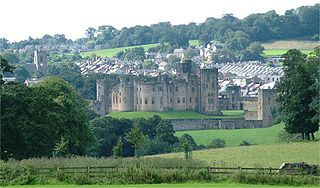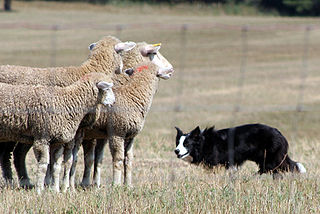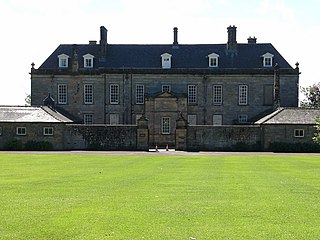See also
- Francesc Cambó (1876–1947), Spanish Catalan politician and translator
Cambo may refer to:

Northumberland is a county in Northern England, one of two counties in England which border with Scotland. Notable landmarks in the county include Alnwick Castle, Bamburgh Castle, Hadrian's Wall and Hexham Abbey.

Alnwick is a market town in Northumberland, England, of which it is the traditional county town. The population at the 2011 Census was 8,116.
Middleton may refer to:

A sheepdog trial — is a competition or test for working abilities of herding breeds dogs. It is a type of dog sport that emerged in the 1860s in New Zealand. By the 1870s regular trials were also being held in Australia and the United Kingdom, and by the end of the 20th century gained popularity in many countries of the world. In competition, dogs demonstrate basic herding management skills assessed by the judge. International and national cynological and sports organisations, sheep and cattle breeders' societies are involved in organising these events. Usually competitions are held with sheep, sometimes other animals are used: ducks or cows.

The European pine marten, also known as the pine marten or the European marten, is a mustelid native to and widespread in most of Europe, Asia Minor, the Caucasus and parts of Iran, Iraq and Syria. It is listed as Least Concern on the IUCN Red List. It is less commonly also known as baum marten, or sweet marten.

The 34th Division was an infantry division of the British Army that was raised in 1914, during the First World War. The division was raised from volunteers for Lord Kitchener's New Armies, that was originally made up of infantry battalions raised by public subscription or private patronage. The division was taken over by the War Office in September 1915. It served in France and Belgium in the trenches of the Western Front for the duration of the war.
NBL may refer to:

Patrick Harvie is a Scottish politician who has served as Minister for Zero Carbon Buildings, Active Travel and Tenants’ Rights since 2021. He has served as one of two co-leaders of the Scottish Greens since 2008, and is one of the first Green politicians in the UK to serve as a government minister. Harvie has been a Member of the Scottish Parliament (MSP) for the Glasgow region since 2003.

Cambo is a village and former civil parish, now in the parish of Wallington Demesne, in Northumberland, England. It is about 11 miles (18 km) to the west of the county town of Morpeth at the junction of the B6342 and B6343 roads. The village was gifted along with the Wallington Estate to the National Trust by Sir Charles Philips Trevelyan in 1942, the first donation of its kind. It remains a National Trust village. In 1951 the parish had a population of 60.
Timothy John Crommelin Eggar is a British businessman and former politician. He holds positions on the boards of multiple organisations including Shiplake College and Cape plc, and was the Conservative MP for Enfield North between 1979 and 1997.

Scotsgap was a stone-built railway station in Northumberland on the Wansbeck Railway, which served the villages of Scots' Gap and Cambo. It was located on the line between Morpeth and Reedsmouth, and was the junction for the branch line of the Northumberland Railway to Rothbury.

Sir William Blackett, 2nd Baronet of Newcastle-upon-Tyne, of Pilgrim Street, Newcastle-upon-Tyne and Wallington Hall, Northumberland, was a British landowner and Tory politician who sat in the House of Commons from 1710 to 1728.

Sir Walter Calverley Blackett, 2nd Baronet was a British baronet and politician who sat in the House of Commons from 1734 to 1777.

Cambo Estate lies close to the village of Kingsbarns in north-east Fife, Scotland. It is within the East Neuk, 10 kilometres (6.2 mi) south-east of St Andrews. At the heart of the estate lies the 19th-century Cambo House, the home of Sir Peter Erskine, Bt and Lady Catherine Erskine. The gardens of Cambo are open to the public, and include the walled garden and seasonal snowdrop gardens. Elsewhere on the estate is the Kingsbarns Golf Links golf course, which co-hosts the Alfred Dunhill Links Championship every year.

Cambo BV is a manufacturer of high quality, mainly large format cameras based in Kampen, the Netherlands, and has the distinction of being the first studio camera manufacturer to produce an all-metal large format camera.
Robert Whinham (1814–1893) was a fiddler, composer and dancing master from Morpeth, Northumberland. Many tunes composed by him are still played, notably the Remember Me hornpipe, Whinham's Reel, and The Cambo March. A 1995 book on his life and music, called Remember Me by Graham Dixon, summarises most of what is known about him.
Dagmar Winter is a bishop in the Church of England. Since 2019, she has served as Bishop of Huntingdon, a suffragan bishop in the Diocese of Ely. She was previously priest in charge of a large, rural parish in Northumbria (2006–2015), and Rector of Hexham Abbey (2015–2019).
Prudhoe is a town in Northumberland, England.
The onshore oil and gas resources in the United Kingdom are located in a number of provinces corresponding to prospective sedimentary basins. Provinces and Basins include the Wessex-Channel Basin, Weald Basin, Worcester Basin, Cheshire Basin, East Midlands Province, West Lancashire Basin, NE England Province, Northumberland-Solway Basin, Midland Valley of Scotland, and the Orcadian Basin.
Cambo oil field is a prospective oil and gas field in the North Sea, 125 kilometres (78 mi) north west of the Shetland Islands, Scotland. The field is in a deep section of the water, some 3,440–3,610 feet (1,050–1,100 m) below the sea level. Development of the field has led to criticism from some green campaign groups stating it goes against the United Kingdoms reduction in carbon emissions. The project has the potential to deliver millions of barrels of oil and over 53 billion cubic feet (1.5×109 m3) of gas.